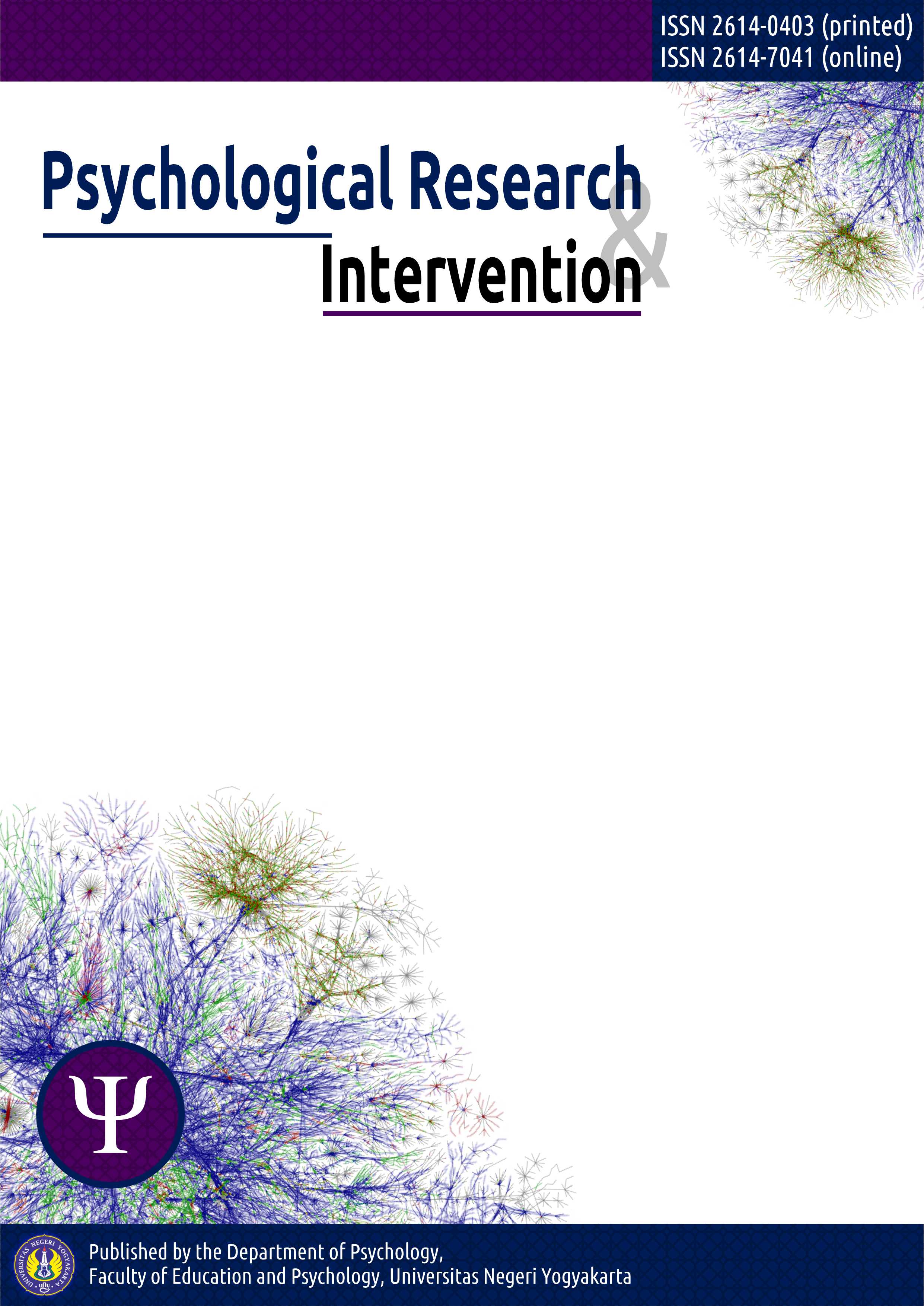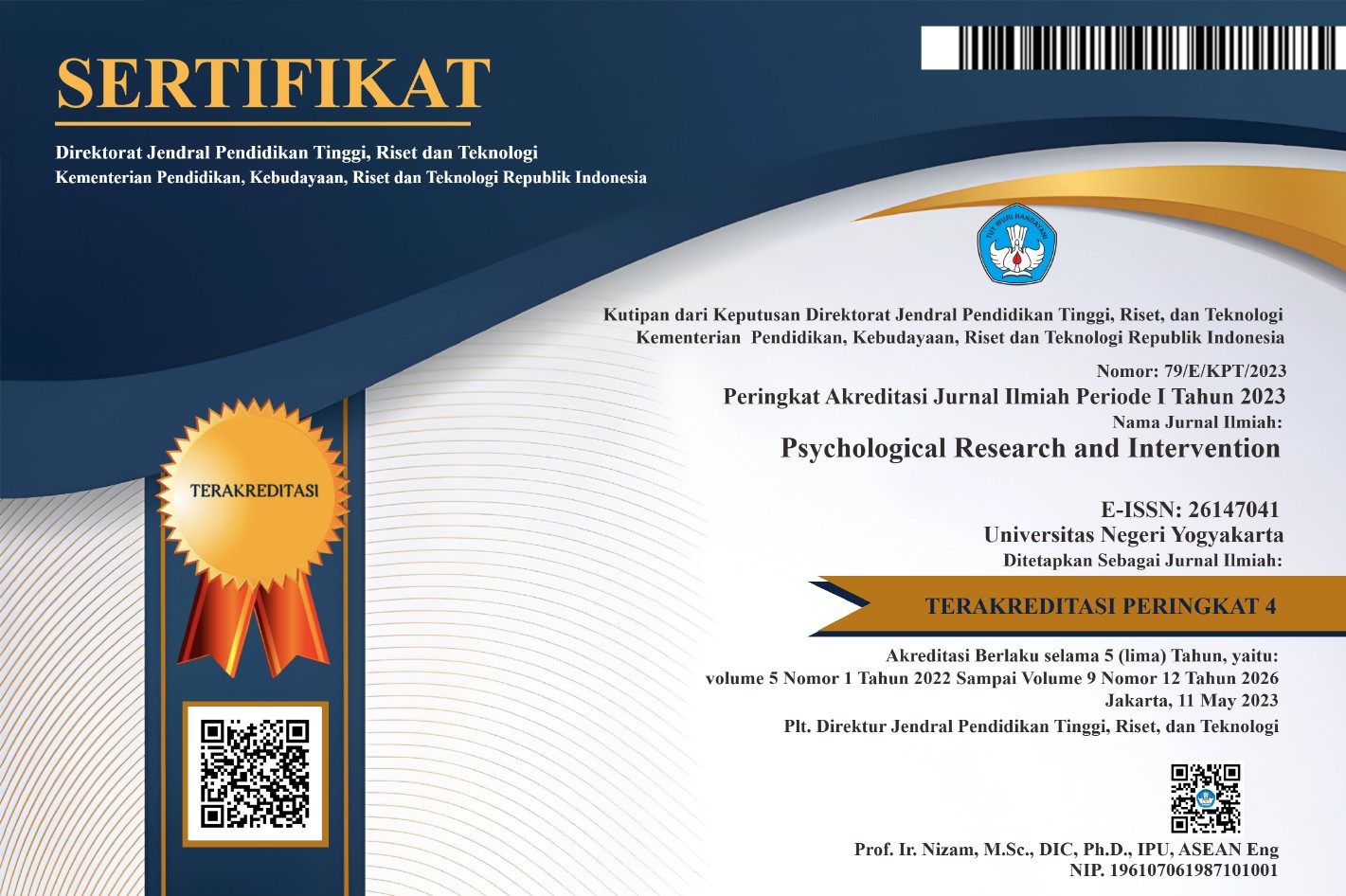Social support as a mediator between social identity and college student's stress
DOI:
https://doi.org/10.21831/pri.v1i1.21196Keywords:
social identity, social support, stress, mediator, studentAbstract
This study aims to find social support as a mediator of social identity against student stress. This study uses a stage cluster random sampling technique, the subject of this study amounted to 375 students scattered on 7 faculties at Yogyakarta State University. The result of the research shows that the social identity level of students is high, social support is high and stress level is classified. The path analysis a proved significant with the value of 0.036 <0.05, on path analysis proved significant with a value of 0.016 <0.05, in path analysis proved significant with a value of 0.000 <0.05, and path analysis was proved significant with value 0.000 <0.05. Mediation analysis is evident and includes partial mediation.References
Aspinwall, L.G. & Taylor, S.E. (1997). A stitch in time: Self-regulation and proactive coping. Psychological Bulletin, 121, 417–436.
Baron, R.A. & Byrne, D. (2004). Psikologi sosial jilid 1 (10th ed.). Jakarta: Erlangga.
Baron, R.M. & Kenny, D.A. (1986). The moderator-mediator variable distinction in social psychological research: Conceptual, strategic, and statistical considerations. Journal of Personality and Social Psychology, 51(6), 1173-1182.
Branscombe, N.R, Schmitt, M.T., & Harvey, R.D. (1999). Perceiving pervasive discrimination among African Americans: Implication for group identification and well-being. Journal of Personality and Social Psychology, 77, 135-149.
Bosch, L.A., Segrin, C., & Curran, M.A. (2012). Identity style during the transition to adulthood: The role of family communication patterns, perceived support, and affect. Identity, 12(4), 275-295.
Cassidy, T. (2004). Mapping variables related to social identity, distress and perceived health in an undergraduate student population. Social Psychology of Education, 7, 339-352.
Cheek, J.M. & Briggs, S.R. (2013). Aspects of identity questionnaire (AIQ-IV). Measurement Instrumen Database for the Social Science, 1-4.
Cinnirella, M. (1998). Exploring temporal aspects of social identity: The concept of possible social identities. European Journal of Social Psychology, 28, 227-248.
Cohen, W.S. (1985). Health promotion in the workplace: A prescription for good health. American Psychologist, 40, 213–216.
Cohen, S. (1992). Stress, social support snd disorder. In H. Veiel & U. Baumann (Eds.), The meaning and measurement of social support. New York, NY: Hemisphere Press.
Cohen, S., Kamarck, T., & Mermelstein, R. (1983). A global measure of perceived stress. Journal of Health and Social Behavior, 24, 385–396.
Cohen, S. & Wills, T.A. (1985). Stress, social support, and the buffering hypothesis. Psychological Bulletin, 98, 310 –357.
Dunkley, D.M., Blankstein, K.R., Halsall, J., Williams, M., & Winkworth, G. (2000). The relation between perfectionism and distress: Hassles, coping, and perceived social support as mediators and moderators. Journal of Counseling Psychology, 47, 437-45.
Dwyer, A.L. & Cummings, A.L. (2001). Stress, self efficacy, social support, and coping strategies in university students. Canadian Journal of Counseling. 35(3), 208-219.
D'zurilla, T.Z. & Sheedy, C.F. (1991). Relational between social problem solving ability and subsequent level. Journal of Personality and Social Problem. American Psychological Association.
Elliott, T.R., Herrick, S.M., & Witty, T.E. (1992). Problem-solving appraisal and the effects of social support among college students and persons with physical disabilities. Journal of Counseling Psychology, 39, 219-22
Frazier, P.A. , & Schauben, L.J. (1994). Stressful life events and psychological adjustment among female college students. Measurement and Evaluation in Counseling and Development, 27, 280-292.
Gottlieb, B.H. (1983). Social support strategies: Guidelines for mental health practice. California, CA: Sage Publication.
Harjana, A.M. (1994). Stres tanpa distres: Seni mengolah stres. Yogyakarta: Kanisius.
Haslam, S.A. (2005). Taking the strain: Social identity, social support, and the experience of stress. British Journal of Social Psychology, 44, 355-370.
Haslam, S.A., Jetten, J., O'Brien, A., & Jacobs, E. (2004). Social identity, social influence, and reactions to potentially stressful tasks: Support for the self-categorization model of stress. Stress and Health, 20, 3–9.
Haslam, S.A. & McGarty, C. (2003). Experimental design: A casuality in social psychological research. In C. Sanson, C.C. Morf, & A.T. Panter (Eds.), Handbook of methods in social psychology (pp.235-264). Thousand Oaks, CA: Sage.
Hogg, M.A. (2004). Uncertainty and extremism: Identification with high entitativity groups under conditions of uncertainty. In V. Yzerbyt, C.M. Judd, & O. Corneille (Eds.), The psychology of group perception: Perceived variability, entitativity, and essentialism (pp. 401-418). New York, NY: Psychology Press.
House, J.S. (1981). Work stress and social support. Reading, MA: Addison-Wesley.
Kohn, P.M., Hay, B.D., & Legere, J.J. (1994). Hassles, coping styles, and negative well-being. Personality and Individual Differences, 17, 169-179.
Kumar, S. & Bhukar, J.P. (2013). Stress level and coping strategies of college students. Journal Physical Education and Sports Management, 4(1), 5-11.
Lazarus, R.S. (1984). Stress appraisal and coping. New York, NY: Springer Publishing.
Levine, R.M., Cassidy, C., Brazier, G., & Reicher, S.D. (2002). Self-categorzation and bystander non-intervention: Two experiment studies. Journal of Applied Social Psychology, 32, 1452-1463.
Marks, D.F., Murray, M., Evans, B., & Esticio, E.V. (2014). Health psychology: Theory, research, and practice. California, CA: Sage.
Nelson, E.S., Karr, K.M., & Coleman, P.K. (1995). Relationships among daily hassles, optimism and reported physical symptoms. Journal of College Student Psychotherapy, 10, 11-26.
Oakes P.J., Haslam, S.A., & Turner, J.C. (1994). Stereotyping and Social Reality. Oxford: Blackwell.
Oakland, S. & Ostell, A. (1996). Measuring coping: A review and critique. Human Relations, 49, 133-155.
Orford, J. (1992). Community psychology: Theory and practice. New York, NY: John Wiley and Sons.
Perrez, M. (1992). Mental health and coping with everyday stressors. In M. Perrez & M. Reicherts (Eds.) Stress, coping, and health: A situation-behavior approach (pp. 137-145). Seattle, WA: Hogrefe & Huber.
Postmes, T. & Branscombe, N. (2002). Influence of long term racial environmental composition on subjective well-being in African Americans. Journal of Personality and Social Psychology, 83, 735-751.
Sarafino, E.P. & Smith, T.W. (2011). Health psychology: Biopsychological interactions. USA: John Wiley & Son.
Stephen W., Muldoon O., Gallagher S., & Fortune, D. (2015). Affiliative and "self as doer" identities: Relationships between social identity, social support, and emotional status amongst survivors of acquired brain injury (ABI). Neuropsychological Rehabilitation, 25(4), 555-573.
Tajfel, H. (1972) Experiments in a vacuum. In J. Israel & H. Tajfel (Eds.), The Context of Social Psychology (pp.69-119). London: Academic Press.
Tajfel, H. (1982). Social identity and intergroup relations. Cambridge: Cambridge University Press.
Taylor, J.R. (1995). Linguistic categorization: Prototypes in linguistic theory (2nd ed.). Oxford: Clarendon Press.
Towbes, L.C. & Cohen, L.H. (1996). Chronic stress in the lives of college students: Scale development and prospective predictive prediction of distress. Journal of Youth and Adolescence.
Turner, J.C. (1982). Towards a cognitive redefinition of the social group. In H. Tajfel (Ed.) Social identity and intergroup relations (pp. 15-40). Cambridge: Cambridge University Press.
Turner, J.C. (1991). Social influence. Milton Keynes: Open University Press.
Turner, J.C. & Oakes, P.J. (1986). The significance of the social identity concept for social psychology with reference to individualism, interactionism and social influence. British Juornal of Social Psychology, 25, 234-252.
Wagiran. (2002). Metodologi penelitian pendidikan: Teori dan implementasi. Yogyakarta: Depublish.
World Health Organization (WHO) (2003). The health of young people: A challenge and a promise. Geneva.












